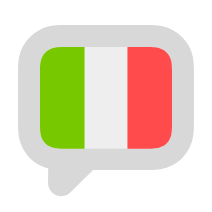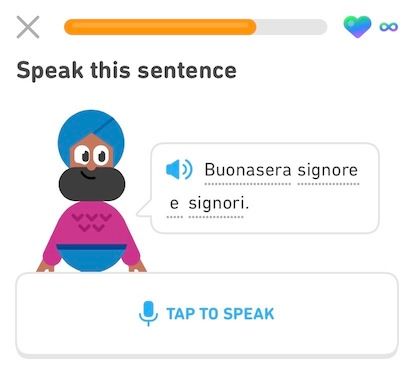
When you think about Italy and Italian culture, you might think of the Roman Colosseum, Michelangelo, the Italian Riviera, delicious food, and even Måneskin, the Italian band that took the world (and Duolingo) by storm when they won Eurovision in 2021! In fact, you can find (at least) one Måneskin lyric in Duolingo's Italian course:

But also knowing fun facts about the Italian language? Now THAT'S amore! And we've got you covered 🇮🇹👇🏼
Italian 101
Italian is a Romance language, which means that it evolved from Latin (like Spanish and French). If you've studied other Romance languages, you'll notice many similarities in the vocabulary and grammar, including cognates and grammatical gender. Italian also has a unique history, including Arabic influence (especially in southern Italy) and because of many political changes in just the last 150 years!
Where is Italian spoken?
Obviously Italian is spoken in Italy, but that’s not the only country where it’s an official language! Italian is also the official language of San Marino and one of four official languages of Switzerland (along with French, German, and Romansh). It also holds official status in the county of Istria in Croatia and in four municipalities of Slovenia—some communities speak Italian because they were part of the Republic of Venice long ago! In addition, Italian is one of the most commonly used languages in Vatican City, which has no official language.
Who studies Italian?
Globally, Italian is the 6th most popular language to study, and it ranks #1 in Malta and Vatican City (by tourists!). It's the 2nd most popular language to study in Italy and San Marino, due to booming tourism, and Italian is also #2 in Argentina, where millions of Italians immigrated in the 20th century.
Duolingo offers 6 Italian courses, for speakers of English, Spanish, Portuguese, French, German, and Chinese. There are nearly 15 million learners studying Italian on Duolingo all around the world!
When we say Italian, what do we mean?
Italian evolved from Latin gradually over centuries, and in fact there has never been one, single "Italian" language! Long ago there were many Latin dialects and accents used in Italy, and as a result there are over 30 regional languages spoken in Italy today. These include Genoese (in Genoa), Sardinian (on the island of Sardinia), Sicilian (in Sicily), and Venetian (in Venice), and these continue to be spoken alongside Italian.
Modern Italian—the variety you learn on Duolingo—developed from the Tuscan dialect that was spoken in Florence and used by many important writers (such as Dante Alighieri). This dialect gradually became the standard language of education throughout more and more of Italy, and today it's considered the official language.
You already know some Italian!
Even if you’ve never studied Italian, you’re probably familiar with quite a few words, especially for food and music.
Italian food vocabulary
Italian cuisine has given English terms like cappuccino, latte (although this means "milk" in Italian and not "coffee"!), pasta, pizza, mozzarella, ricotta, lasagna, gnocchi, ravioli, spaghetti, panini, cannoli, and gelato.
And in fact, you may already know how to make words plural in Italian! Many Italian words have an -i at the end to show that they are plural, so gnocchi, ravioli, spaghetti, panini, and cannoli are actually plural in Italian! To talk about a single piece, change the -i to an -o: But they're so delicious that it can be tough to eat just one gnocco, raviolo, spaghetto, or cannolo!
Italian music vocabulary
English has also adopted many Italian terms to refer to musical concepts. If you’ve ever learned to read music, you may recognize words such as forte, piano, tempo, allegro, andante, lento, ritardando, soprano, alto, aria, and piccolo.
Some of these words may surprise you when you encounter them in Italian, though, as they have a more common, non-musical meaning, too. For example, forte means “strong,” allegro means “joyful,” alto means “tall” or “high,” and piccolo means “small.” Once you know these meanings, you may be able to figure out the relationship to their musical usages, and you'll encounter them a lot in general, non-musical conversation!
In addition to food and music, Italian is full of other words that as an English speaker you’ll probably already recognize, such as antenna, casino, confetti, finale, graffiti, lava, loggia, manifesto, nostalgia, paparazzi, piazza, politico, riviera, stucco, studio, and villa.
When in Rome… you'll want to know some Italian!
There's no better way to learn about a culture than through its language. By studying Italian, you can bring yourself closer to connecting with Italian speakers and engaging with the culture that gave you the art, literature, cuisine, and music you already love! Italian is a language full of surprises for you to discover throughout your learning journey.
